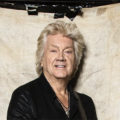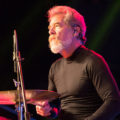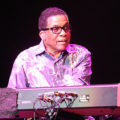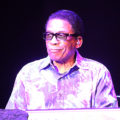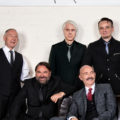“Say Somethin’” with the soulful David Clayton-Thomas, plus a bit of Blood, Sweat & Tears, Woodstock
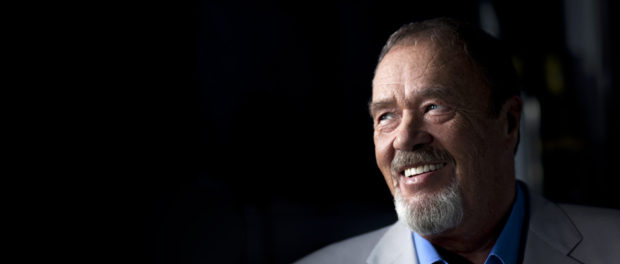 Photos provided by Eric Alper PR
Photos provided by Eric Alper PR
In his five decades fronting horn rockers Blood, Sweat & Tears, David Clayton-Thomas belted out the classic likes of “You’ve Made Me So Very Happy,” “And When I Die” and “Spinning Wheel,” generating a pile of platinum and gold albums in the process.
As a solo artist, the soulful Canadian singer’s proved even more active, logging over ten albums throughout the 2000s alone, despite seeing dwindling profit margins due to internet piracy and streaming services where royalty rates are next to nothing.
Nonetheless, to quote the title of Clayton-Thomas’ current collection, the triple Grammy Award-winner feels an urgent need to “Say Somethin’” when to comes to current events, and as he tells Chicago Concert Reviews in a conversation edited for length, the socially conscious collection also draws parallels to both a troubled childhood and the band’s days of headlining Woodstock.
How did the concept of “Say Somethin’” come about?
David Clayton-Thomas: We had been talking about it for a while, about how music in the ‘60s really had changed the world. You think of Woodstock, for instance, and the parallels that were going on today with the kids from Parkdale, the 100,000 kids in the streets to march against gun violence. Would Woodstock ever happen again? Probably not, but maybe something like it could happen again. So we set about to write a pile of music that actually says something and that’s the album title of course, “Say Somethin.’” There’s just so much subject matter today, isn’t there? Not just gun violence, but you have immigration, kids in cages at the border, you have climate change that threatens us every day and you have the madness that’s going on today with the pandemic and the race riots. We just thought that I could use this opportunity in the studio to actually try and make a difference.
 Clayton-Thomas: Criminal justice has always been a favorite of mine because I was thrown into reformatories when I was like 15-years-old. I was a homeless kid, and what did they do with homeless kids? Put them in jail. I spent a lot of time since then trying to fix that particular problem. I work with an organization here in Canada called Peacebuilders. What we have been very effective [at for] kids going into the juvenile justice system is instead of having the courts send them off to reformatories, [they] send them to us for counseling. A lot of times these kids don’t need to go to jail. What they need is some help, and at 15-years of age, a kid is still reclaimable. Not if you send him off to prison he’s not. If a kid goes into jail at 15, he has an 80 percent chance of spending his life in and out of the system. 80 percent! That means the juvenile justice system in America has an 80 percent failure rate. What business would ever tolerate that? We, on the other hand, with our Peacebuilders program have a pretty close to 90 percent success rate. The kids who are diverted to our Peacebuilders program, less than 10 percent ever reoffend again, so it’s working…That is one of the threads that runs through the album, from the song “The System” to “Burwash.” These are songs that are from personal experience and they deal with a system that’s broken.
Clayton-Thomas: Criminal justice has always been a favorite of mine because I was thrown into reformatories when I was like 15-years-old. I was a homeless kid, and what did they do with homeless kids? Put them in jail. I spent a lot of time since then trying to fix that particular problem. I work with an organization here in Canada called Peacebuilders. What we have been very effective [at for] kids going into the juvenile justice system is instead of having the courts send them off to reformatories, [they] send them to us for counseling. A lot of times these kids don’t need to go to jail. What they need is some help, and at 15-years of age, a kid is still reclaimable. Not if you send him off to prison he’s not. If a kid goes into jail at 15, he has an 80 percent chance of spending his life in and out of the system. 80 percent! That means the juvenile justice system in America has an 80 percent failure rate. What business would ever tolerate that? We, on the other hand, with our Peacebuilders program have a pretty close to 90 percent success rate. The kids who are diverted to our Peacebuilders program, less than 10 percent ever reoffend again, so it’s working…That is one of the threads that runs through the album, from the song “The System” to “Burwash.” These are songs that are from personal experience and they deal with a system that’s broken.
One of my earliest influences was probably [Bob] Dylan, listening to Dylan songs in the ‘60s and hearing how those songs were saying the same things we were all talking about in the coffee shops. He gave us a voice. And I think The Beatles picked up from there and then music in general became a really powerful tool for social change. At that time, I was living in New York where it was very socially active…
Blood, Sweat & Tears of course came along shortly thereafter. What did you take away from that entire experience?
Clayton-Thomas: All 50 years of it in one sentence? (laughs)
As much or as little as you want.
Clayton-Thomas: Well, for me, as a kind of blues/R&B singer to come into Blood, Sweat & Tears was like going to college. It was like getting a music degree because these guys were very skilled, very highly educated, very highly trained musicians, and so for me, it was like going to music school. I learned so much over the years with them, including how to read music. I didn’t know how to read music when I joined Blood, Sweat & Tears and the boys got together and got me because I had to be able to communicate with them. As a songwriter, I had to communicate with my musicians. I was a bar band musician from Toronto and these guys were like Juilliard graduates, so it was a learning experience that’s for sure.
 This project has a very bluesy, soulful and understated feel compared to those big brassy records. What were you going for musically?
This project has a very bluesy, soulful and understated feel compared to those big brassy records. What were you going for musically?
Clayton-Thomas: I’ve made everything from full orchestra albums with 20, 30, 40 musicians, to little trio and quartet albums. This album was basically a collaboration between myself and four of my very dear friends, very close friends of mine that live here in Toronto. We decided when we broke the sessions that we were going to make this record with these five musicians, so there’s no big horn section, there’s no big strings or anything else. We wanted to keep the focus on the lyrics, the story and the songs, and didn’t feel like we needed the big production. Cutting it with just a rhythm section, just guitar, bass, drums, keyboards and myself, kept a very intimate, personal kind of feel to it. I’m not saying I’m going to do that on the next album cause I always change. I’ve never made albums the same way in my whole life, but that was this one and it was very much a product of the musicians I collaborated with on it. You notice every song on the album is co-written with one of the musicians and that was the whole thing that we started out with. The five of us made the entire record.
What keeps you so prolific? Is it simply a matter of having something to say, the joy that comes from it or the need to create?
Clayton-Thomas: Well, it’s what I do. I don’t know how to stop it; you know? I really don’t know how to stop doing it. It’s what I’ve done my whole life. I’m already writing a next album, even though there’s no real industry for that album. We don’t do this for the money (laughs). We do this because it’s who we are…[In] 2005, when I decided there was no future in Blood, Sweat & Tears anymore- it was basically just a tribute band- I decided if I was gonna make some new music and record again that I would have to leave. They hadn’t been in the recording studio in 30 years and there’s no interest in recording and writing new music. When I came back to Canada [after living in New York all those years with the band], I found there’s a tremendous interest in new music. I recorded three albums in my first three years back here and I’ve recorded close to 10 or 11 albums in the last 15 years, so I spent a lot more time recording than I have touring. With Blood, Sweat & Tears, I was on the road 250 days a year for almost 50 years. I don’t do that anymore. Now if I do eight to ten concerts in a year, they’re concerts I want to play.
Do you think your performance days are behind you because of the pandemic or are you going to give it another try once it’s possible?
Clayton-Thomas: Well, for myself at my age, I’m not really sure. It depends. Even if they have concert venues opened up, let’s say by the end of this year, it’s still a question of how long is it going to be before people are comfortable going into a concert hall again? That could take years. We don’t know what the damage is going to be. I feel sorry for the folks who just put 50 million dollars into a renovation of the wonderful Massey Hall here in Toronto, which is one of the great concert halls in the world with unbelievable acoustics and everything else. It was due to open up in September, but even if it does open in September, how soon can you get 3,000 people to sit shoulder to shoulder in a concert hall again? That’s something that we have no way of knowing, or if it will ever come back, or if music will totally move online and there will be no more concerts and no more baseball games. Maybe they’ll put it all online now. It will all be virtual. I certainly hope not. I miss my hockey games big time. I’m in Canada with no hockey. It’s like having no beer! It’s not Canada without hockey. It’s a terrible time we’re living through. Everything that we lived for has been flipped over on its back, hasn’t it? It’s been turned upside down.
 There’s one concert that I’m sure will live forever in your mind and that many continue to wonder about, which was the one and only Woodstock. Was it as idealistic and logistically disastrous as everyone seems to say?
There’s one concert that I’m sure will live forever in your mind and that many continue to wonder about, which was the one and only Woodstock. Was it as idealistic and logistically disastrous as everyone seems to say?
Clayton-Thomas: Maybe a bit of both (laughs). The governor of the state I think declared it a natural disaster area because you had 600,000 people and about five cops and nobody knew how to manage it. Nobody knew what had happened. It just came out of nowhere and it was magical in a lot of ways. We had over 600,000 people there in three days and there was not one instance reported of violence in three days. Can you imagine any city of 600,000 to go three days without killing somebody? Not today you can’t! Woodstock was about peace. It wasn’t about sex, drugs and rock n’ roll. It was about ending that damn war and getting kids home. Those kids that were at Woodstock, every one of them had friends that came home from Vietnam in a body bag and they had enough of it. They decided to put a stop to it. So the whole philosophy behind Woodstock was all about peace. It even said on the poster “3 days of peace & music.” For anybody to start a fight or raise trouble would have just betrayed the whole event. For three days, people sat in the mud, in the rain, in the outdoors with not enough porta potties, not enough water and not enough food, and not one incident of violence. That’s a pretty miraculous thing in and of itself!
Last but not least, can you recall any standout shows you played in the Chicago area?
Clayton-Thomas: Oh, God yes! Chicago is one of the great concert places in the world! I’ve played Mister Kelly’s, one of the great jazz clubs in the world! Blood, Sweat & Tears and Roberta Flack at Mister Kelly’s going way, way back. One of our first big gigs out of New York City was going to Chicago to play the Auditorium Theatre. We were so thrilled! Chicago is one of the great music towns in the world and it’s always a treat to play Chicago.
I was really looking forward to playing the [Arcada] Theatre. We had two nights booked there, but that’s not gonna happen now and we don’t know when it will happen. That’s the uncertainty right now. A few of the dates already booked have taken alternate dates in 2021, but they don’t even know if they’re going to happen yet. It’s just the uncertainty, so we’re having to get used to the idea that we’re home for the next couple of years.
For additional information on David Clayton-Thomas, visit Facebook.com/DavidClaytonThomasOfficial.

